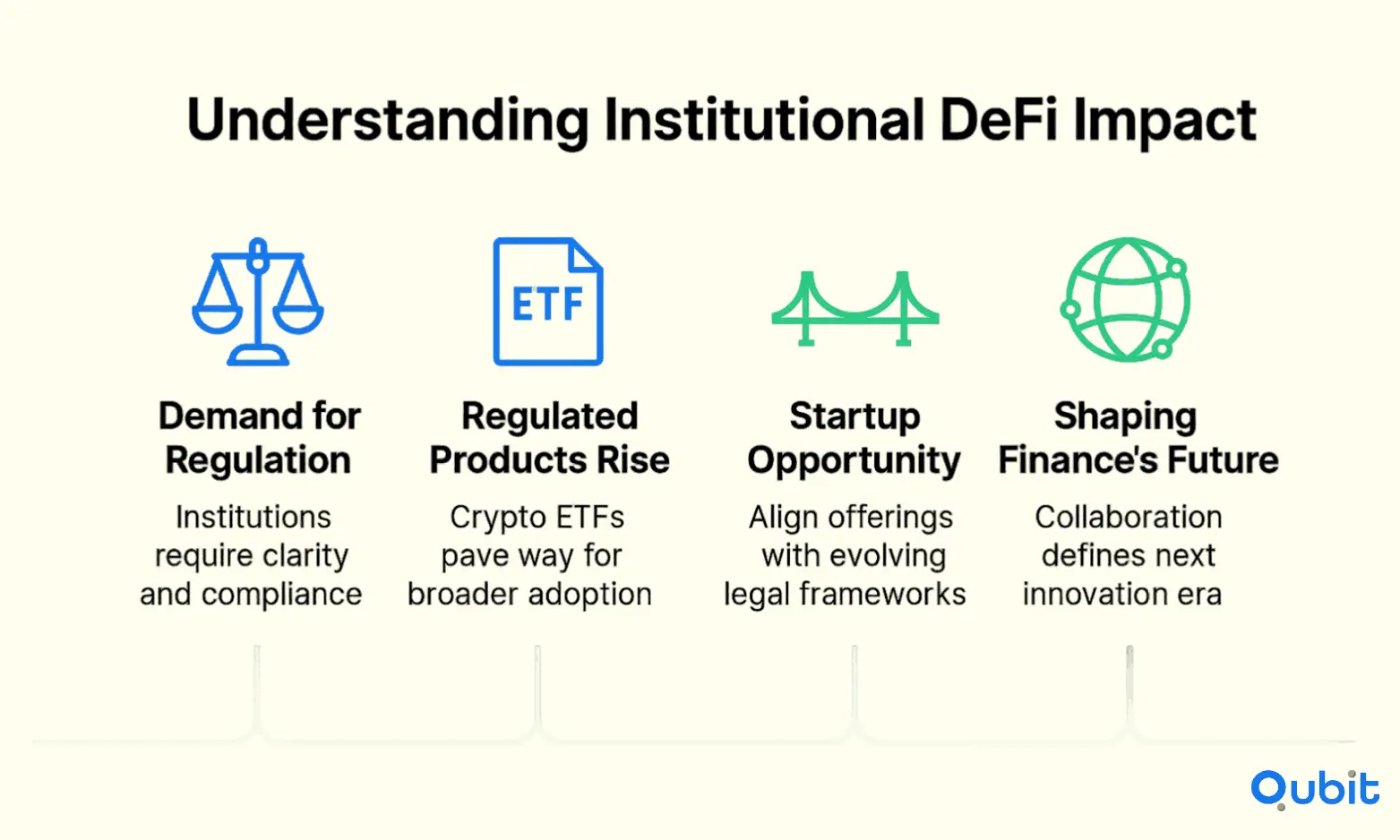The decentralized finance (DeFi) ecosystem is witnessing a transformative shift as institutional players begin to explore its potential. This growing interest signals a pivotal moment for blockchain start-ups, offering both opportunities and challenges. Institutions bring significant capital, credibility, and expertise, which can accelerate innovation and adoption within the DeFi space. However, their entry also introduces complexities such as stricter regulatory scrutiny and heightened competition.
For start-ups, understanding how institutional involvement reshapes funding strategies is crucial. Analytical discussions are deepened by evidence from DeFi funding models, outlining varied approaches that complement institutional entry narratives. This blog aims to guide blockchain founders through the implications of institutional participation, from tokenization trends to evolving funding dynamics. Let’s jump right in!
Institutional Interest in DeFi: Challenges and Compliance Risks
The growing institutional interest in decentralized finance (DeFi) is reshaping the crypto ecosystem, yet significant hurdles remain. While 86% of institutional investors surveyed are either allocating capital to digital assets or planning to do so by 2025, the gap between enthusiasm and actual capital deployment persists. This disconnect stems from regulatory uncertainty and operational complexities that institutions face when engaging with DeFi protocols.
Regulatory Challenges
Compliance remains a critical barrier for institutions exploring DeFi. Regulatory frameworks are still evolving, leaving institutions uncertain about how to align their operations with existing laws. For example, the question of whether the SEC will approve crypto ETFs with staking underscores the complexity of integrating DeFi into traditional financial structures. Institutions must navigate these uncertainties while ensuring adherence to anti-money laundering (AML) and know-your-customer (KYC) requirements.
Operational Risks
Beyond compliance, operational risks such as smart contract vulnerabilities and liquidity concerns add layers of complexity. While solutions like BlackRock’s BUIDL, a tokenized money market fund, demonstrate how traditional fixed-income structures can be mirrored on-chain, the broader adoption of such innovations requires robust risk management frameworks. Institutions need to address these risks to build confidence in DeFi’s reliability and scalability.
Bridging the Gap
For startups aiming to attract institutional capital, bridging compliance and risk management is essential. Insights from DeFi compliance fundraising provide practical strategies for aligning with regulatory frameworks, enabling startups to unlock partnerships with banks and asset managers.
As institutions increasingly adopt DeFi protocols for yield generation, lending, and tokenized assets, the credibility of the crypto ecosystem continues to grow. However, addressing compliance and operational challenges will be pivotal in turning institutional interest into tangible capital inflows.
Understanding the Impact: Why Should We Care About Institutional DeFi?
The growing institutional interest in decentralized finance (DeFi) is reshaping the financial ecosystem in profound ways. As traditional institutions explore DeFi, they bring with them a demand for regulatory clarity and structured investment products.

Legal uncertainties surrounding DeFi have historically deterred institutional participation. However, the emergence of regulated products, such as crypto ETFs, is paving the way for broader adoption. For example, the article "Are more crypto ETFs coming this year?" highlights how these products are gaining traction, signaling a shift toward compliance-driven innovation. This trend is crucial for bridging the gap between decentralized systems and traditional finance.
Start-ups in the DeFi space have a unique opportunity to capitalize on this institutional interest. By aligning their offerings with evolving legal frameworks and creating investment products that appeal to conventional investors, they can reposition themselves as viable contenders for traditional funding. Observations about evolving market dynamics are extended by the broader view provided in DeFi investment trends, reflecting shifts in blockchain funding practices.
Institutional DeFi matters because it’s not just about technology, it’s about transforming the rules of engagement for global finance. As this sector matures, the collaboration between decentralized platforms and traditional institutions will likely define the next era of financial innovation.
Tokenised RWAs: Institutional Form, Limited Capital Flow
- Tokenised real-world assets (RWAs) have reached a market size of USD 23 billion, highlighting their potential to revolutionize traditional asset management through fractional ownership and streamlined transactions.
- Despite the impressive market valuation, institutional funding in the RWA sector remains limited due to ongoing concerns.
- A major challenge is the ambiguity around on-chain asset claims, as tokenisation raises questions about the legal enforceability of digital asset ownership, making institutional investors cautious.
- Clear regulatory frameworks are essential for institutional participation, as these investors require compliance assurance and risk mitigation.
- Start-ups can address these issues by piloting controlled tokenisation projects within regulated environments, demonstrating feasibility and adherence to compliance standards.
- Such pilots help build trust with institutional players and can act as a bridge toward broader adoption of tokenised RWAs.
- Mainstream acceptance of tokenised RWAs will depend on resolving regulatory uncertainties and showcasing tangible benefits through structured, compliant experimentation.
Tokenised Private Credit: High Yields Amid Institutional Hesitancy
Tokenised private credit products are emerging as a compelling option for investors seeking high yields, typically ranging between 9% and 12%. Despite this attractive return potential, institutional adoption remains limited due to fragmented legal frameworks and the lack of robust secondary markets. These factors create barriers to scalability and liquidity, which are critical for institutional participation.
Start-ups, however, are uniquely positioned to capitalize on these opportunities. By focusing on flexible tranche structuring, as demonstrated by platforms like Tradable, they can cater to varying risk appetites and attract a diverse investor base. Tradable exemplifies how tokenised private credit can be structured to balance risk and reward effectively, offering a model for other innovators in the space.
To succeed, start-ups must refine their due diligence processes. This involves not only assessing the creditworthiness of borrowers but also ensuring compliance with evolving legal standards across jurisdictions. Enhanced transparency and rigorous risk assessment can help mitigate the challenges posed by fragmented legal structures, fostering greater investor confidence.
Curated Vaults & Permissioned Pools: Institutional Ambitions, Retail Realities
Efforts to bridge institutional finance with decentralized protocols often face significant hurdles. Curated vaults and permissioned pools, such as Aave’s Arc, aim to provide KYC-gated solutions tailored for regulated entities. However, these initiatives frequently encounter low adoption rates, highlighting the gap between design intentions and practical realities. For instance, Aave’s Arc, despite being designed for institutions, holds a mere $50k in Total Value Locked (TVL). This minimal participation underscores institutional hesitance stemming from unresolved legal uncertainties.
While these solutions attempt to address compliance requirements, their approach often remains superficial. Regulatory clarity is critical for institutional players, yet many DeFi platforms fail to offer robust frameworks that align with stringent legal standards. Instead of merely adding KYC layers, start-ups must rethink product designs to cater to the nuanced needs of institutional finance.
The challenge lies in balancing retail accessibility with institutional-grade compliance. Without addressing the deeper concerns of regulatory adherence, curated vaults risk stagnation. For DeFi platforms aiming to attract institutional capital, the focus must shift from superficial compliance measures to comprehensive solutions that instill confidence in regulated entities.
Bitcoin Yield Products: A Gateway for Institutional Adoption?
- Bitcoin yield products are gaining traction as an accessible entry point for institutions interested in decentralized finance, offering digital asset exposure through familiar and structured yield strategies.
- These products simplify engagement with blockchain opportunities, allowing institutions to earn predictable returns without navigating the complexities of advanced DeFi protocols like liquidity pools or token swaps.
- Regulated custodial frameworks are central to institutional adoption, providing secure asset storage and ensuring compliance with regulatory standards, which addresses common concerns about security and transparency.
- Robust risk management frameworks tailored to Bitcoin yield products further enhance institutional confidence, offering a controlled environment for exploring blockchain-based returns.
- By bridging traditional finance with blockchain, Bitcoin yield products serve as a practical gateway for institutions to participate in the digital asset ecosystem..
Future Outlook: Evolving Regulatory Landscapes and Capital Inflows
As global regulatory frameworks for emerging technologies mature, the potential for institutional capital inflows is becoming increasingly evident. Clearer regulations and streamlined legal processes could act as catalysts, encouraging more traditional investors to explore opportunities in innovative sectors like blockchain and fintech. This shift promises to unlock substantial funding avenues for start-ups, enabling them to scale operations and drive innovation.
For entrepreneurs, staying ahead of regulatory developments is not just a necessity—it’s a strategic advantage. By closely monitoring milestones in policy changes, start-ups can proactively adapt their business models to align with compliance requirements. This agility positions them to attract institutional investors who prioritize risk mitigation and regulatory adherence.
Your investigation of DeFi entry strategies is contextualized by insights from blockchain startup fundraising strategies, which elaborate on overall funding trends in the blockchain space.
Conclusion
Institutional DeFi offers start-ups a transformative pathway to secure funding while fostering trust and compliance. By addressing regulatory challenges, adopting tokenized assets, and refining compliance strategies, businesses can position themselves as credible partners for institutional investors. Crafting a compelling narrative around your DeFi approach further enhances your appeal, demonstrating innovation and reliability in equal measure.
If you're ready to explore the complexities of institutional DeFi, we at Qubit Capital provide tailored Fundraising Assistance to help you secure essential capital. Let’s get started.
Key Takeaways
- Blockchain fundraising leverages innovative tokenization and decentralized models.
- A clear vision, a strong team, and rigorous regulatory compliance are critical.
- Diverse models, including ICOs, IEOs, and STOs, provide tailored solutions for capital raising.
- Effective risk management and transparent communication are essential drivers of investor trust.
- Recent trends demonstrated by Iris Energy, Avalanche, and Bridge underscore rapid industry growth.
Frequently asked Questions
Why are institutions suddenly eyeing DeFi?
Institutions bring deep pockets and credibility, which can turbocharge DeFi adoption. But they also demand clearer rules and rock-solid risk controls before signing off—so startups must get their compliance game on point.


 Back
Back



